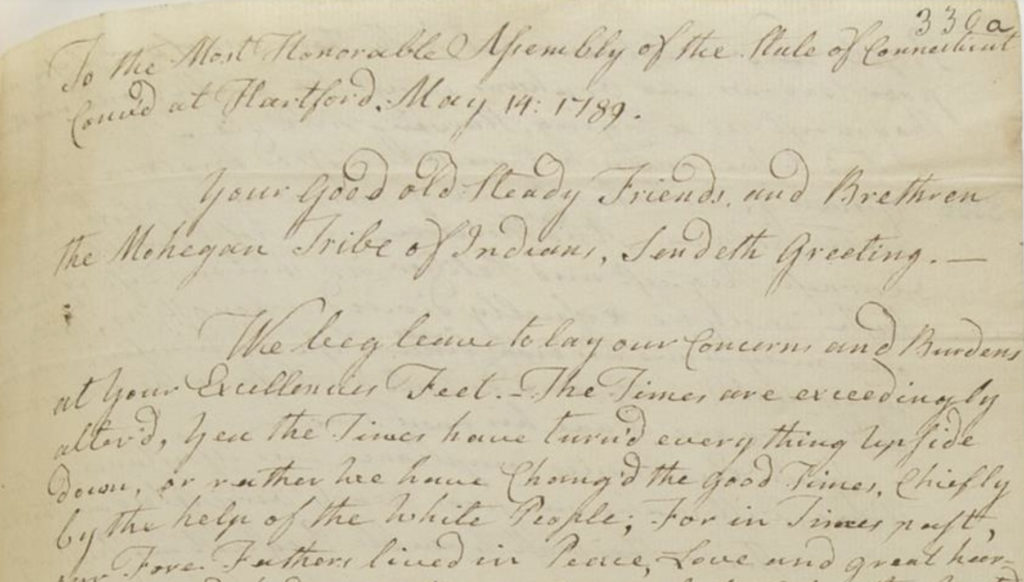
Petition of the Mohegan to the Connecticut General Assembly, May 14, 1789, Connecticut State Library. photo: Yale Indian Papers
By Elizabeth J. Normen
(c) Connecticut Explored Inc. Spring 2021
Subscribe/Buy the Issue!
The petition by the Mohegan to the Connecticut General Assembly in May 1789 describes, in poignant and poetic language, the environmental impact of British colonial settlement on Native American communities. It was submitted a little more than a year after Connecticut became the fifth state to join the United States of America, and it reveals the 150-year struggle of Native Americans to survive and resist the ongoing pressures of British—now American—colonization. In asking the legislature for help, the petition states that through the actions of white people, “the times have turned everything upside down.”
In crafting a piece of persuasive writing, the Mohegan petitioners, represented by tribal leaders Henry Quaquaquid and Robert Ashpo (or Ashbow), begin with flattery and by calling upon the long alliance of the Mohegan with the Connecticut Colony. [See “Exploring and Uncovering the Pequot War,” Fall 2013.] They go on to describe an Edenic past and invoke their communal way of life through the metaphor of the dish and the fire.
In 1671 the Connecticut Colony agreed that 20,000 acres of land between Norwich and New London was permanently Mohegan, and in 1680 it passed a formal reservation law. But encroachment by British settlers was constant and largely ignored or justified by the colony. In 1704 the Mohegan brought a lawsuit against the colony to force it to honor its reservation law. Queen Anne sided with the Mohegan, but the colony ignored the royal decree, and the Mohegan reservation was reduced to 5,000 acres in 1725, and to 2,700 acres at the time of this petition.
The suffering endured by the Mohegan from the impact of British settlement was becoming acute. Important animal populations had all but disappeared due to loss of habitat, overhunting, and overfishing. Harvey Smith and Tim Clark, in Voices of the New Republic: Connecticut Towns, 1800 – 1832, Vol. II (The Connecticut Academy of Arts & Sciences, 2003), estimate that by the time of this petition only about 35 percent of Connecticut was forested. Black bear, white-tailed deer, beaver, and wild turkey were nearly extirpated—beaver and wild turkey by the late 1600s, bear sometime after that. Connecticut passed one of the first conservation laws—to protect deer populations—in May 1667, but deer, too, were scarce in the state by the time of this petition.
Note: Spelling has been standardized to modern English.
To the most honorable assembly of the State of Connecticut
Convened at Hartford, May 14, 1789Your good old steady friends and brethren, the Mohegan Tribe of Indians, sendeth greeting. –
We beg leave to lay our concerns and burdens at your Excellencies feet. The times are exceedingly altered, yea the times have turned everything upside down, or rather we have changed the good times, chiefly by the help of the white people; For in times past, our forefathers lived in peace, love and great harmony; and had everything in great plenty. When they wanted meat, they would just run into the bush a little ways with their weapons and would soon bring home good venison, raccoon, bear and fowl, if they choose to have fish, they would only go to the river or along the sea shore, and they would presently fill their canoes with variety of fish, both scaled and shell fish, and they had abundance of nuts, wild fruit, ground nuts, and ground beans, and they planted but little corn and beans and they kept no cattle or horses for they needed none.— And they had no contention about their lands, it lay in common to them all, and they had but one large dish, and they could all eat together in peace and love.— But alas, it is not so now, all our fishing, hunting and fowling is entirely gone. And we have now begun to work on our land, keep cattle, horses, and hogs; and we build houses, and fence in lots. And now we plainly see, that one dish and one fire will not do any longer for us.—Some few there are, that are stronger than others; and they will keep off the poor, weak, the halt, and the blind, and will take the dish to themselves. Yea, they will rather call the white people and molattoes to eat with them out of our dish, and poor widows and orphans must be pushed [to]one side and there they must set a crying, starving and die.
And so we are now come to our good brethren of this assembly, with hearts full of sorrow and grief, for immediate help.— And therefore, our most humble and earnest request and petition is that our dish of [illegible], may be equally divided amongst us, that every one may have his own little dish by himself that he may eat quietly, and do with his dish as he pleased and let everyone have his own fire.—
Your Excellencies compliance and assistance at this time, will make our poor hearts very glad and thankful,
This is the most humble request and petition of your true friend and brethren,
Mohegan Indians.—
By the hands of our brothers,
Henry Quaquaquid
Robert Ashpo
Explore!
“Breaking the Myth of the Unmanaged Landscape,” Spring 2012
Find all of our stories about Native Americans on our TOPICS page.
